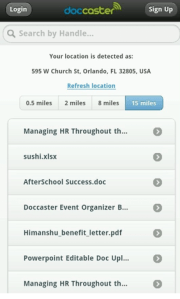Doccaster wants to disrupt document-sharing, but it’s attacking the space from a new angle: it’s not just about storing files in the “cloud,” it’s about tying files to a location. The company is launching a beta version of its web-based utility today that lets users upload then broadcast any number of files. Those files immediately become available to anyone within a 15-mile radius and can be searched for either by proximity or by a Doccaster ID (similar to a Twitter ID).
The bootstrapped, Orlando-based startup spun out of a previous effort called Gotootie, which was an early player in the location-based chat scene launched back in 2010. Still convinced of the potential in the location-based space, co-founders Kyle Steele (CEO) and Himanshu Pagey (CTO), who met while at the University of Central Florida, have now narrowed their focus to document sharing and discussion, with a specific emphasis on the convention space.
After having spent time talking to participants and organizers, the team wanted to find a solution to many of the problems with printed literature, including not just the cost of printing documents, but the chaotic and messy nature of their distribution, the environmental impact, and the lack of analytics for documents around things like views, shares, and comments. Doccaster tracks all those metrics, enabling companies to see the views, demographics and conversations around their files uploaded to the platform.
 Interestingly, the document discussion aspect is tied to the location, too. Only those in or near the venue can join in, which makes the product different than an online office suite or cloud storage company. For now, Doccaster supports viewing, downloading, and bookmarking files, but Steele tells me the plan is to add integrations with other online storage services, so you could push the files shared in Doccaster to your Dropbox, Google Drive, Amazon Cloud Drive, or Box, for example.
Interestingly, the document discussion aspect is tied to the location, too. Only those in or near the venue can join in, which makes the product different than an online office suite or cloud storage company. For now, Doccaster supports viewing, downloading, and bookmarking files, but Steele tells me the plan is to add integrations with other online storage services, so you could push the files shared in Doccaster to your Dropbox, Google Drive, Amazon Cloud Drive, or Box, for example.
The introduction of the Doccaster ID is another element that conference participants can use to make their files more easily available. Instead of having to search through all the files at that location, you can put in a company’s ID to pull up just their shared files.
During its beta, Doccaster will remain free, but at some point in the future, the plan is to transition to a freemium model built around document activity. Also in the works are mobile apps for iPhone, iPad and Android.
Interested users can sign up now, here, from web or mobile.
